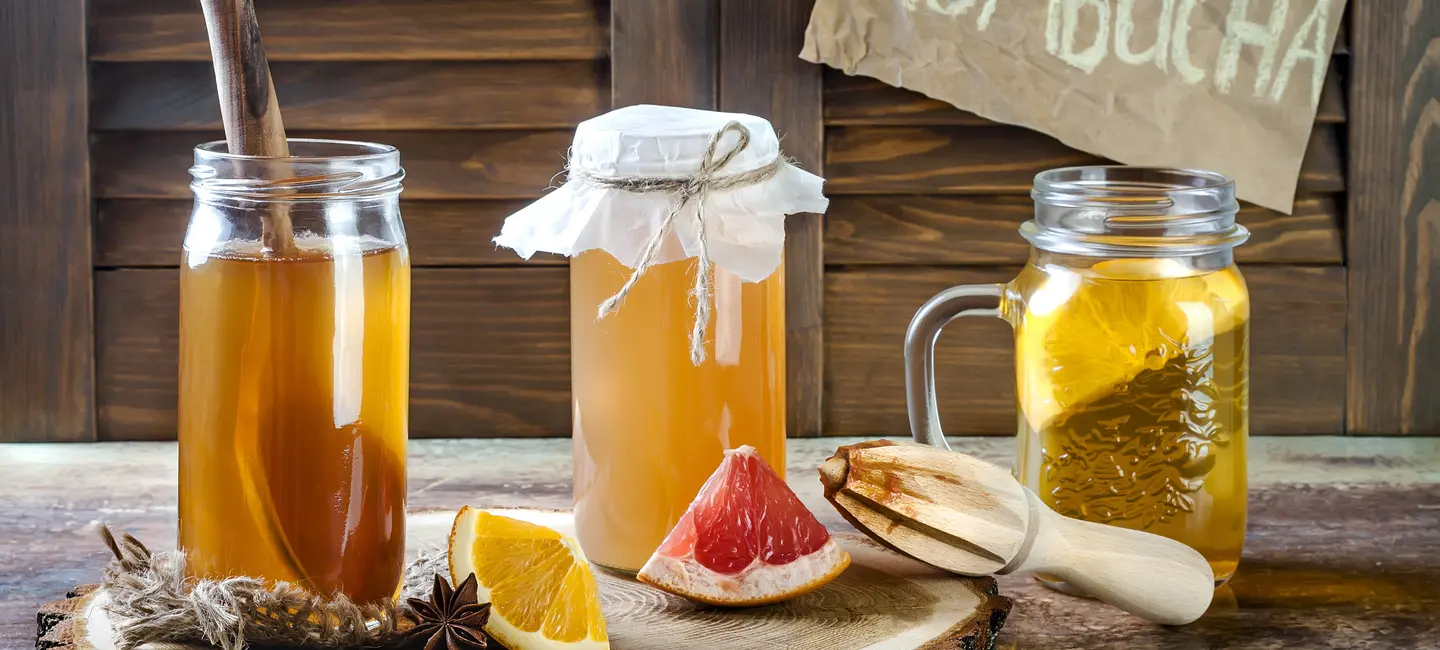
Kombucha is made by fermenting tea (black, green, red, or white) with sugar and other ingredients with specific types of bacteria and fungi.
Kombucha contains alcohol, vinegar, B vitamins, caffeine, sugar, and other substances. The cultures used to make kombucha are called SCOBY (Symbiotic Culture of Bacteria and Yeasts). They commonly contain Acetobacter xylinum, Gluconobacter, and Saccharomyces cerevisiae.
People use kombucha for aging, diabetes, memory, obesity, and many other conditions, but there is no good scientific evidence to support these uses.
Is It Effective?
There is interest in using kombucha for a number of purposes, but there isn't enough reliable information to say whether it might be helpful.
Is it Safe?
When taken by mouth: Kombucha that is made properly and in clean conditions is possibly safe. Side effects might include stomach upset.
Kombucha that is made under conditions where it can be contaminated is possibly unsafe. Kombucha that is made in containers that contain toxic chemicals, such as the lead in pottery glazes, is likely unsafe. These chemicals can get into the kombucha and might cause serious side effects or poisoning.
Special Precautions & Warnings:
Pregnancy and breast-feeding: Kombucha is possibly unsafe when taken by mouth while pregnant or breast-feeding. Stay on the safe side and avoid use.
Alcohol use disorder: Kombucha contains alcohol. People with alcohol use disorder should avoid kombucha.
Diarrhea: Kombucha contains caffeine. The caffeine in kombucha, especially when taken in large amounts, can worsen diarrhea.
Irritable bowel syndrome (IBS): Kombucha contains caffeine. The caffeine in kombucha, especially when taken in large amounts, can worsen diarrhea and symptoms of IBS.
Surgery: Kombucha seems to affect blood glucose levels. This might interfere with blood glucose control during and after surgery. Stop using kombucha at least 2 weeks before a scheduled surgery.
Weak immune system: Don't use kombucha if you have a weakened immune system. Kombucha can support the growth of bacteria and fungus that can cause serious infections.
Disulfiram (Antabuse)
Interaction Rating=Minor Be watchful with this combination.
Kombucha contains alcohol. The body breaks down alcohol to get rid of it. Disulfiram decreases the break-down of alcohol. Taking kombucha along with disulfiram can cause a pounding headache, vomiting, flushing, and other unpleasant reactions. Don't drink any alcohol if you are taking disulfiram.
Medications for diabetes (Antidiabetes drugs)
Interaction Rating=Moderate Be cautious with this combination.
Kombucha might lower blood sugar levels. Taking kombucha along with diabetes medications might cause blood sugar to drop too low. Monitor your blood sugar closely.
Caffeine-containing herbs and supplements: Kombucha contains caffeine. Taking it along with other supplements that contain caffeine might increase caffeine side effects. Examples of supplements that contain caffeine include black tea, coffee, green tea, guarana, and yerba mate.
Herbs and supplements that might lower blood sugar: Kombucha might lower blood sugar. Taking it with other supplements with similar effects might lower blood sugar too much. Examples of supplements with this effect include aloe, bitter melon, cassia cinnamon, chromium, and prickly pear cactus.
There are no known interactions with foods.
Kombucha is made by fermenting tea (black, green, red, or white) with sugar and other ingredients with specific types of bacteria and fungi. The fermentation process takes 7-14 days at room temperature.
There isn't enough reliable information to know what an appropriate dose of kombucha might be. Keep in mind that natural products are not always necessarily safe and dosages can be important. Be sure to follow relevant directions on product labels and consult a healthcare professional before using.
Algue de Thé, Champagne of Life, Champignon de la Charité, Champignon des Héros, Champignon de Longue Vie, Champignon Miracle, Combucha Tea, Dr. Sklenar's Kombucha Mushroom Infusion, Kombucha Thé, Laminaire de Thé, Mushroom Infusion, Fungus Japonicus, Kargasok Tea, Kombucha Tea, Kombucha Mushroom Tea, Kwassan, Manchurian Fungus, Manchurian Mushroom Tea, Petite Mère Japonaise, Spumonto, T'Chai from the Sea, Té de Kombucha, Thé de Combucha, Thé de Kombucha, Tschambucco.
Information on this website is for informational use only and is not intended to replace professional medical advice, diagnosis, or treatment. While evidence-based, it is not guaranteed to be error-free and is not intended to meet any particular user’s needs or requirements or to cover all possible uses, safety concerns, interactions, outcomes, or adverse effects. Always check with your doctor or other medical professional before making healthcare decisions (including taking any medication) and do not delay or disregard seeking medical advice or treatment based on any information displayed on this website.
© TRC Healthcare 2024. All rights reserved. Use and/or distribution is permitted only pursuant to a valid license or other permission from TRC Healthcare.
